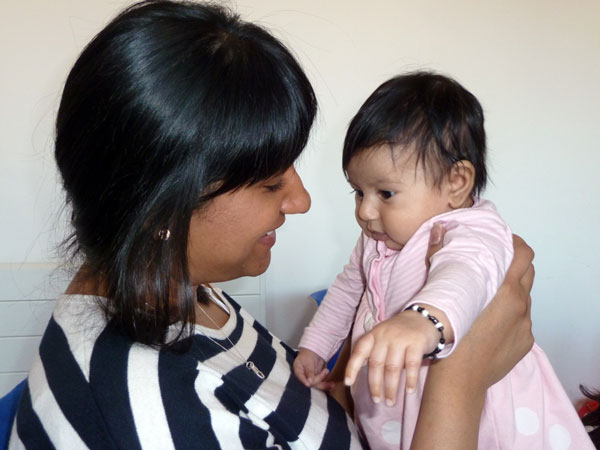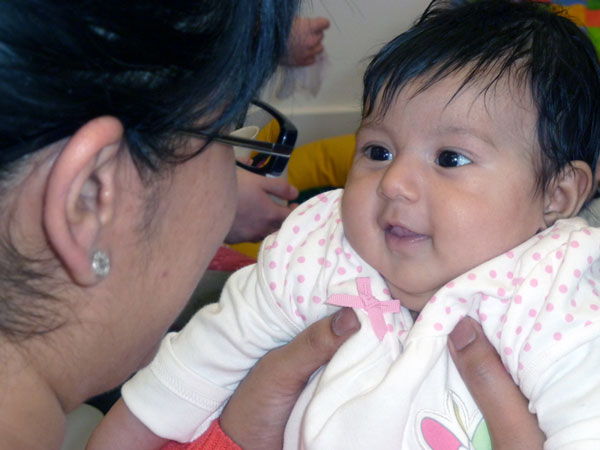Breast milk is a complete food containing everything a baby needs for around the first six months of life. Although levels of iron in breast milk aren’t very high, a baby is also born with iron stores (iron reserves in the body). The iron levels in breast milk complement a baby’s iron stores until they start eating solid food at around six months of age and can access iron from their wider diet.12
This article answers frequently asked questions about iron in breast milk, looks at the reasons why a baby’s iron stores may be low and shares current recommendations around giving iron supplements to a breastfed baby.
Is there any iron in breast milk?
Human milk is said to have low levels of iron (0.2-0.5 mg iron per litre).3 A baby gets most of its iron needs from their iron stores which are accumulated during gestation.
What about iron levels in formula?
Iron is added to formula at a higher concentration than breast milk to compensate for the fact that the iron supplements added to formula milk are much harder for a baby to absorb. Babies can absorb 50% of the iron in breast milk, compared with only 2-9% of the iron in artificial milk and 4% from fortified baby cereals4. Lactose, the main sugar in breast milk, helps with iron absorption along with vitamin C in breast milk.
For most healthy babies, the higher iron content in formula is not better than the normal amount in breast milk despite marketing that may give that impression. In fact too much iron may increase the risk of illness and even affect a baby’s growth rate (see next section).
Can a baby have too much iron?
Too much iron may cause:
- Higher rates of infection. Breast milk contains a protein called lactoferrin that binds to any extra iron that a baby doesn’t use. This keeps harmful intestinal bacteria in check because otherwise they thrive and multiply if there is excess iron. If this system is overloaded by iron supplements, the harmful bacteria can thrive, potentially leading to higher infection rates, diarrhoea and even microscopic bleeding56
- Slower growth 78 and neurodevelopmental delays9 may be associated with too much iron
- Changes in micronutrient status. Some studies show decreased absorption of zinc and changed vitamin A metabolism if iron supplements are provided when not needed 10
- Constipation. Too much iron may lead to constipation11
- Colic. Iron supplements can affect some babies by causing colic type symptoms.12
What are symptoms of low iron or iron deficiency in a baby?
Although it is not good for a baby to have too much iron, it is nevertheless very important that they have enough. Symptoms of low iron levels or iron deficiency include:
- Low iron. Symptoms of low iron can include slow weight gain, pale skin, no appetite and irritability (fussy behaviour) 13
- Iron deficiency. Iron deficiency is said to be the most common nutrient disorder across the world. A deficiency in iron can lead to developmental delays and neurological problems which may not be reversible when treated.1415
Although most breastfed babies will have sufficient iron from their iron stores and breast milk, if there is any doubt a blood test will confirm a baby’s iron status.

When might a baby’s iron stores be low?
Situations when a baby’s iron stores may be low include:
Low iron status of the mother in pregnancy
Some studies indicate that if a mother is anaemic (has low iron levels) during pregnancy it is a risk factor for restricting the amount of iron available to the unborn baby16. Georgieff (2009) also links maternal hypertension, diabetes or if the mother smoked during pregnancy with a baby potentially having low iron status. Iron deficiency in pregnancy can also increase the risk of a baby having a low birth weight or being premature in addition to increasing the possibility that a baby may have low iron stores17. However the iron status of the mother is not the only factor determining infant iron stores and more research is needed.18
Premature birth/low birth weight
If a baby was born prematurely they may not have had enough time to get sufficient iron from their mother during the last few weeks of pregnancy1920
Small for dates
Babies with a lower than expected (growth-restricted) birth weight might also be at risk of low iron stores21
Cutting the umbilical cord early
If baby’s umbilical cord was cut before it stopped pulsating the baby may not have received the full complement of iron and blood supply.22 The Womanly Art of Breastfeeding states:
If your baby’s cord was cut before it stopped pulsating, he missed out on up to a third of his intended blood supply. That’s a lot of iron to lose. he should be fine for the first half year, and will probably be fine from then on as well, but when he starts solids look for iron-rich foods such as meats, dark green leafy vegetables, and beets (much better than the type of iron in baby cereal).
See Rachel Reed’s The Placenta: essential resuscitation equipment, 2018 for more reading.
Early solids
If your baby started solid foods very early; some fruits and vegetables can bind with the iron in human milk before a baby has a chance to absorb it and iron stores may drop (Womanly Art, 2010).
Cows’ milk
Iron stores may also be low in babies who are given cows’ milk to drink during their first year. Some studies have shown that giving cows’ milk to babies in the first twelve months could cause traces of intestinal bleeding causing lower levels of haemoglobin (iron containing protein in the blood) and ferritin (a measure of the body’s iron stores).23
Absence of iron rich food
Breastfed babies who don’t have any iron rich foods24 after six months of age may also have low iron stores.
Health reasons
Babies with certain health conditions may have low iron stores.

Iron in breast milk
Can I increase the iron in breast milk by taking supplements?
No, a mother can’t increase the iron levels in her breast milk by eating iron rich foods or taking supplements.2526
Can drinking coffee reduce the iron levels in breast milk?
Some references online connect drinking a lot of coffee with less iron in breast milk. Muñoz et al say that drinking 450ml coffee per day might affect iron levels in breast milk27 to 1 litre 28 per day.
Three cups of coffee or more per day may be associated with a reduction in iron content of breast milk of up to one third of that of women who don’t consume coffee. Moreira (2005)29 noted the iron-reducing activity of coffee beverages was not influenced by caffeine, but rather by the presence of chlorogenic acids in coffee. Chronic coffee consumption by the mother could result in iron deficiency anaemia in the breastfed infant (Liston, 1998)30.
See Coffee, Caffeine and Breastfeeding for more information.
Routine iron supplements for baby: yes or no?
Breastfeeding authors Wambach and Spencer 31 say that unless a baby is anaemic, iron supplements could be harmful during the first six months after birth and are not usually needed. However guidance varies between countries.
UK guidance
The National Institute for Clinical Excellence (NICE) guidance in UK says supplements may be needed for low birth weight breastfed babies:
Prophylactic iron supplementation may be required in babies of low birth-weight who are solely breast-fed; supplementation is started 4–6 weeks after birth and continued until mixed feeding is established.
European guidance
The European Society for Pediatric Gastroenterology, Hepatology, and Nutrition (ESPGHAN) says there is not enough evidence to supplement babies of normal birth weight:
There is insufficient evidence to support general iron supplementation of healthy European infants and toddlers of normal birth weight.
American guidance
In 2010 the American Academy of Pediatrics issued guidance recommending that exclusively breastfed term infants have iron supplements from four months of age. This was strongly countered in a Letter to the Editor32 by a number of medical professionals who were concerned that the recommendations didn’t address the potential harm of iron supplementation or the difference in how easily the iron in human milk is absorbed compared with iron-fortified fluids and foods.
The current guidance from the Amercian Academy of Pediatrics still recommends routine iron supplements in healthy breastfed babies from four months of age:
at 4 months of age, breastfed infants should be supplemented with 1 mg/kg per day of oral iron beginning at 4 months of age until appropriate iron-containing complementary foods (including iron-fortified cereals) are introduced in the diet
The US based Academy of Breastfeeding Medicine says:
there is potential harm in infant growth and morbidity when iron supplementation is provided to iron-sufficient infants. If iron supplementation is given before 6 months, it should be given as a 1 mg/kg/day distinct iron supplement until iron-fortified cereals (7–7.5 mg ferrous sulfate/day) or other iron-rich foods such as meat, tofu, beans, and the like are initiated at 6 months of age with other complementary foods.
Iron and milk production
If a mother is anaemic after birth this can be associated with tiredness, low milk supply and postnatal depression (OUH, 2017). Mohrbacher says that anaemia is a risk factor for low milk production and delayed milk increase after birth. 33
Summary
Breast milk normally contains the perfect amount of iron to complement a baby’s iron stores until they start eating solid food. There are a few situations where a baby’s iron stores may be low such as if the mother was anaemic during pregnancy or if a baby was born prematurely. Babies need sufficient iron for healthy growth but too much iron also has negative health consequences. Consult with your health professional if you have any concerns about yours or your baby’s iron status.